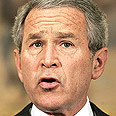
Naive policy: Bush
צילום: איי פי
Hamas wins; America loses
Hamas victory shows American-imposed democracy can backfire
Earlier this week, U.S. President George Bush rejected the possibility of diplomatic talks with Hamas before the organization cancels its calls to destroy Israel.
But at the beginning of his speech he saw fit to praise the democratic process that made the Palestinian elections possible in the first place.
As someone who has already proudly praised the success of democratic parliamentary elections in Afghanistan and Iraq, Bush has once again raised a profound question: Does the American strategy of imposing democracy on the third world – including the Arab world in particular – advance world interests and Western culture?
Failed approach
The current feeling is that the present administration's approach has failed.
We who have lived in the heart of the storm for decades and have seen the Arab-Muslim political culture from up close lack the luxury of patience that the superpower can allow itself, especially when its institutions and population are far from the conflict with the Islamic world.
Five years after September 11, Washington would do well to ask itself a question: Has the current drive to realize the naive vision of promoting American values and culture overseas (is that really their vision, or could it be a cover-up for material interests far more concrete?) derived any benefit, or has that drive done damage to the goal?
It is questionable whether four years of a "test run" in Afghanistan justify such a huge investment. In addition, the "cover" they grant by continuing the war against al-Qaeda and the hunt for Bin-Laden hasn't proved much.
In Iraq the elections process has been completed, but there are many question marks about a government based on a Shiite majority is really what the Western world wants.
Potential ties to Iran and to the extreme line other Shiites in the region seek to advance are an explicit reason to worry.
Growing casualties
On the ground, the situation is even worse: The U.S. army has sustained more than 2,000 casualties, and the Iraqi security forces have paid a much higher price. Continued terrorist activity – with unprecedented breadth and intensity – will certainly not reduce those numbers.
This all raises a big question mark: Is it even possible to create democratic institutions and to establish local powers with the ability to assume security responsibility in Iraq at some future stage?
And returning to our own backyard: It seems that here, too, the strategy seems poised to trip and fall. It wouldn't be too harsh to say the democratic wind emanating from Washington forced Israel to agree to Hamas participation in the elections.
American miscalculation
It seems that even if some officials in Jerusalem wanted to keep the organization out of elections, directly or indirectly (simply by canceling them) – it couldn't stand up to the American diktat on the matter.
The American approach certainly anticipated that Hamas' entry into politics would happen slowly, as a modest parliamentary faction, without too much power to change the rules of the game in Palestinian politics, including vis-a-vis relations with Israel.
The Americans apparently also believed that Hamas' staged entry into politics would soften its principles and would allow the organization to eventually ease its way into negotiations with Israel.
But any gamble you can't afford to lose is a bad gamble.
What appears this morning as a Hamas victory burns a lot – not because of the stunning failure of the policies that allowed it to occur, but rather because of the expected impact of the victory for Israel, and of the reality of a Palestinian government headed by the Islamic Resistance Movement.
Once again we see the crooked results of the United States' forced democracy in the region: Israel must once again bear the brunt of the decision, while Washington continues to be far away (at least geographically.)
There is one bit of good that could come of all this, particularly in light of Hamastan.
The next prime minister, Ismail Haniya, has no intention of disarming his organization, but he has learned very quickly that things look very different from the top, and he will be required to adopt a moderate line vis-a-vis Israel.
Even Mahmoud al-Zahar, one of the organization's most extreme leaders, said Wednesday he would not rule out a temporary agreement with Israel without recognizing Israel's legitimacy.
There could be security arrangements, political or economic talks in exchange for a "cease fire", he said
And so it seem the Hamas government could bring Israel the extended quiet it seeks, and/or get legitimacy for carrying out a further disengagement, on the way to establishing permanent borders for the country.
Brig. Gen. (res.) Dr. Yossi Ben-Ari is the co-director of the Israeli-Palestinian Center for Science and Research) and was a senior intelligence officer at the National Security College










